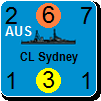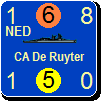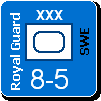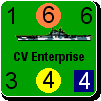joshuamnave
Posts: 967
Joined: 1/8/2014
Status: offline

|
Reinforcements! I'll try to remember to include a screenshot of expected reinforcements at the end of the turn this time. I think putting down reinforcements is one of my favorite parts of every turn. It's like Christmas day all over again!
The big news this turn is the 9 range 3 strength Italian bomber, which is quickly assigned a pilot and put on the board. The British have a few spare pilots, but will be moving most of its CV's back home this turn for retrofit and some of the carriers are currently without any air units at all. We'll keep those pilots in reserve until next turn.
Germany currently has 3 idle resources. Rather than letting them go to waste, Germany arranges to transport them, along with a German build point, to Italy. Italy is going to need to spend more on land units than I typically spend as a result of the attack on Nice. I'll probably build out the German nav bombers to help in the Med while Italy recovers.
According to the trade agreements in place, Japan is sending the US a build point, but we know by now that that's a fantasy. The Dutch are also donating 2 oil per turn to the Japanese, but already that has to be done manually each turn, since the conquest of the Netherlands.
The turn begins, as all turns must, with an initiative roll. Both sides roll a 6, but the Axis get a +1 on their roll and retain the initiative. At the start of the game, the Axis have a +2 on initiative rolls, but that is the far end of a dynamic scale. Two things can cause the pendulum to swing: If either side has both the first and last initiative in a turn, the marker moves toward their opponent. That happened in sept/oct, so this turn the Germans only got a +1. The second thing that can cause the marker to move is demanding an initiative reroll. The side with the positive initiative modifier can demand a reroll of the initiative, at the cost of moving the marker toward the other side. If the marker is in the middle, then either side can demand a reroll. In this case, the Axis have the initiative advantage and also won the initiative roll, so no reroll is possible.
When you win the roll, you get to choose whether to go first or not. Most of the time, you're going to want to go first, but sometimes it might be better to let the other side go first to give yourself a better chance at moving the initiative marker. In this case, the Axis definitely want to go first to exploit the breakthrough in Nice before the allies can plug the hole. The large number of unguarded convoys also make for a tempting target, and depending on the weather Germany may take a combined action.
The weather roll is a 7, with snow in the north temperate and rain in the Med. The Japanese southern expeditionary force has fine weather in the north typhoon zone.
Germany elects to take a combined, while Italy takes a land action. This is a bit of roll reversal - more commonly the turns will start with Italy taking a combined or a naval action while Germany takes land actions, but the Italians want to move more than 2 ground units this turn and Germany is more concerned with triggering sub searches than with land moves in the snow. Japan also takes a land action.
Germany has no naval moves to make, but a lucky roll of 1 in the Faeroes Gap finds the British convoys. Germany spends 6 surprise points bumping up its own naval chart, and the British merchant marine loses 2 convoys and aborts 3 more. Reasoning that the Germans can't get that lucky again (after all, the dice have memory!) the CW elects to stay and fight, as do the Germans. Unsurprisingly, the German subs lose contact with the merchant marines and the fight ends.
In China, the Japanese attempt to ground strike the southernmost Chinese unit in the mountains. Nobody is more surprised than Yamamoto when the bombers actually find their target. Later it is determined that the Japanese air commander misunderstood his orders and sent his bombers to attack a bridge 100 KM to the north, but they missed the target. Landing their bombs on the Chinese infantry was just a happy accident.
Meanwhile, Von Leeb rails himself to the hex just east of Nice. By stopping on a non city hex, Von Leeb has in essence created a rail head that other units can rail to later in the turn. He's also not taking up a spot on the front line, since he's going to spend the entire turn disorganized after railing in. The Italians move their reserves up to the border. They would love to move west from Nice and pin the British HQ to the spot, but in the rain and snow none of their units can move fast enough to cover Nice while the mech moves forward. Moving deeper into France under those conditions is just begging to be cut off, disorganized and destroyed. In Africa, Balbo and one infantry start marching up the coast toward Tunis and the Ethiopians take French Somaliland. What's the strategic significance of taking out the allied east African colonies? I don't know. But it's easy enough to do on your way to marching up the coast toward Egypt.
In Japan, the marines seize the Chinese resource in the south and move down the road toward Nanning. Even though it will trigger a roll for a US entry chit, taking nanning this turn is important, so Chinese units don't pop up there next turn. Yamamoto moves west one hex to keep the marines in supply. If the Japanese attack the flipped unit this impulse, it will be at +6, which could be costly. Clearing the Chinese out of the mountains is like getting rid of Republicans in Congress - as difficult as it is essential. After some reflection I undo the marine's move, and instead bring him up to the front line. Adding him to the fight will bring it close to +8. Not attacking this impulse gives the Chinese a chance to move a second unit into the hex, and then the ground strike may end up being wasted, as I won't be able to muster enough units for a decent attack until next turn. If all goes well, the marine can still grab the resource later this turn. In the north, the Japanese march into Yenan and the Americans are unfazed. The Taihoku militia occupies Nanyang, and America still slumbers. The remainder of the northern expeditionary force moves in around the ChiCom infantry in the mountains east of Sian. As long as it is sitting in the mountain, that 7-3 has 14 strength on defense. At some point, I'll have to make a low odds attack against it, but I'll wait until clear weather and a successful ground strike.
The only attack this impulse is the one in south China, which happens at +7.750. A brief word here about fractional odds - I can't imagine ever playing without them. All they do is take away the slide rule aspect of the game. It's ridiculous to think that a 20:10 attack is twice as good as a 19:10 attack, but that's what happens without fractional odds. With fractional odds on, you don't have to wrangle out the exact number of points needed to get to the next odds level. Every unit counts, as does every point of air and naval support. In this case, the .750 means that the computer will roll 3 dice. If the result is lower than 750, the odds level will go up to +8, if not it will stay +7. The actual roll is 254, so the attack goes forward at +8. The Japanese roll a 13 for a modified 21. The Chinese unit dies and half the Japanese are disorganized. This will put an end to the advance in the south this turn, although the marines will stay face up and still make a run for the resource and Nanning next impulse.
The Germans finish moving their bombers west, and rebase the Nav to Cagliari where it straddles two sea zones and can provide ground support in North Africa or the south of France. Yamamoto reorganizes one ground unit and the Nav bomber.
The CW decides not to declare on Italy just yet. Sure, they would have a nice shot at the Italian fleet, but they would also be leaving Wavell very exposed (assuming a naval action for the UK), plus the US entry hit with such an empty US entry pool seems like a very high price to pay. On the other hand, the Russians are willing to risk it in order to take Bessarabia.
So let's talk about the Balkans now. The rules governing the politics of the Balkans are covered by 19.6.2 (RAC pp 147-8). The decisions at this point all revolve around Yugoslavia and what Germany's plans for it are. Earlier I said that a lack of German pressure on Yugoslavia made Russia more comfortable delaying Bessarabia. This is because once Germany declares war on Yugoslavia, Berlin can declare Rumania as an active ally, and Russia can no longer demand Bessarabia. With any kind of threat lined up against Yugoslavia in Sept/Oct, Russia will usually demand Bessarabia ASAP. If Russia decides not to demand Bessarabia, then Hungary, Rumania and Bulgaria all remain neutral until Germany goes to war with either Russia or Yugoslavia (Hungary and Rumania) or Greece (Bulgaria). Bulgaria can also align with Germany if Germany controls Belgrade (which would require a war with Yugoslavia, but unlike the other two, just going to war isn't enough). By not demanding Bessarabia, Russia can force Germany to declare war on Yugoslavia, or wait until the start of Barbarossa to align the Balkans. On the other hand, Bessarabia gives Russia 2 cities near the border which make it much easier to set up a screen for the start of Barbarossa. Remember that on a surprise impulse, units attacking across a river are not halved, so by pushing the border one hex away, the Russians can set up a line behind the river that won't be as vulnerable to a surprise impulse.
So the Russian demanded Bessarabia. Germany must either allow or deny the claim. Denying the claim forces Russia to declare war on Rumania, with all the incumbent effects on US entry. That's tempting. To sweeten the deal, if Germany can enforce a peace on Russia, then Germany can align Hungary, Rumania and Bulgaria in subsequent impulses. As you'll see soon, this has a huge impact on Yugoslavia. So what does it take to enforce a peace? Ah... here's the tricky part for Germany. To enforce a peace, Russia must control no hex inside Rumania other than the border hexes during a peace step, which happens at the end of the turn. Because Russia demanded Bessarabia at the start of the first allied impulse, Rumania would have to keep Russia out of Rumania proper for an entire turn, and that's a tall order. If Germany can't enforce a peace, Russia can in theory conquer Rumania, seizing the oil fields. At the very least, Russian strat bombers are going to pound Ploesti, denying Germany the oil. If Russia conquers Rumania, to make matters worse, Russia and not Germany can align Bulgaria. Of course, conquering Rumania is a long shot. As soon as Russia and Rumania go to war, Germany can align Hungary and rail a few units into Rumania. They can't fight the Russians, but they can sit in Ploesti and Bucharest and the Russians can't fight them either. So the real danger is non stop bombing of the oil fields until the war begins.
What happens if the Germans allow the Russian claim? First, Bessarabia becomes Russian for all purposes, including reinforcements arriving in Cernauti and Chisinau. Worse yet for the Germans, Russia immediately begins supplying Germany with one fewer resource per turn under to Molotov-Ribbentrop pact. The following turn, Bulgaria and Hungary press their own territorial claims against Rumania. If Rumania allows the claims, Germany can align Hungary and Bulgaria in subsequent impulses, but Rumania won't align with Germany until Germany is at war with either Yugoslavia or the USSR. If Rumania refuses the territorial claims, Bulgaria will align with Russia and Hungary stops giving Germany its resource and won't align until Germany declares war on Russia. But Rumania aligns right away.
What does all of this have to do with Yugoslavia? Germany wants control over Yugoslavia and Greece because it makes things much easier for the axis in the Med. Greece can only be conquered, but Yugoslavia can be either conquered or aligned. Obviously, aligning it means expending fewer units on minor military campaigns and the addition of the Yugoslavian units to the force pool. To align Yugoslavia (RAC 19.7) the Axis must control Italy, Hungary, Rumania, Bulgaria, Albania and Greece. If you followed the political ramifications of Bessarabia closely, you realize that the only way to align Hungary, Rumania and Bulgaria without going to war with either Yugoslavia or Russia is if Russia demands Bessarabia, Germany says no, and then enforces a peace at the end of the turn.
TL;DR - if Germany wants to align Yugoslavia, it has to decline the Russian demand for Bessarabia and then prevent Russia from advancing into Rumania proper.
It's the start of winter, the weather is bad, the strat bomber is going to be less effective until March, so Germany rolls the dice and says no. Russia declares war on Rumania. To the allies chagrin, the "4" chit was removed from the US entry pool, along with a "1" chit. This was a big hit on US entry, and all but guarantees the UK will not declare war on Italy any time soon (or at all). Stalin vows to make the Rumanians pay for their obstinacy.
Rumania sets up with one goal in mind... to slow down the Russian long enough for the turn to end or Germany to rail in some border guards. The Axis need to keep Russia out of Rumania proper, and their best ally is General Winter.
CW takes a naval action, eager to reset its convoys, put some escorts out to sea, and intent on bringing one more ground unit into northern france. The French take a land action. Somehow they need to contain the Italian breakthrough without compromising their northern line. The French decide to turn over defense of Lille to the British. Meanwhile, a British naval action means that Wavell remains stuck in Marseilles. Rather than try to move him north, the Brits will evacuate him later this turn, once the BEF has safely landed in northern France.
The spare convoy points go into Faeroes Gap. The Germans did not sink enough tonnage to disrupt British production this turn, but Winston writes himself a reminder to increase production of British merchant ships just in case. The home fleet along with one transport sails into the North Atlantic, picking up the big infantry unit from London. Next impulse it will land in France, and the impulse following the CW will pull out the two HQ's. With that in mind, 1 transport at home and 1 in Gibraltar are held in reserve. The remaining transport heads south, intent on bringing volunteers from South Africa closer to the front lines. The CP's in NEI are broken down and used to extend the convoy line down to Australia and up to Hong Kong. The CP's in Iceland will be used in a few turns to shift the convoy line north, sending fewer resources through the north atlantic.
The TB-3 in Kiev strat bombs Ploesti. It's a roll of 9, costing Germany 2 oil resources for the turn. Without the oil rules, this is just a small hit to production. Playing with the oil rules, this would be a much most costly gamble on Germany's part.
The snow makes ground strikes much less effective, but it is a surprise impulse, and Russia sends bombers over all 3 Rumanian units in Bessarabia. Only the Cavalry is flipped.
Wavell creates problems for the allies, as his presence in Marseilles makes it impossible for France to rail units into Toulon. Instead, one HQ rails into the mountain resource, followed by an infantry out of Lille. France shifts border units around and swaps the mountain unit for the unit in Lyons. Having the mountain unit in Lyons makes that hex very difficult for the Axis to take. It's a factory city in the mountains garrisoned by a mountain unit surrounded on 4 of its 5 attackable sides by a river. The German High Command doubles the size of its secretarial pool in preparation for extra condolence letters it expects to have to write. Lille is now an open city, but the British will move in next impulse. Russia moves its mech along with Timoshenko southwest. There's nothing to stop them from walking into Rumania next impulse, unless... Meanwhile, the Russian army also prepares to attack Chisinau. Unfortunately, in the snow, the attack is just not practical. Russia's real strategy here is to ooze around the Rumanians into Rumania proper, making it impossible for Germany to enforce a peace.
The impulse ends. The weather remains bad for the following impulse with a modified 6. Save file for the game below.
incidentally, is there any way to set the forum to word wrap while typing/editing posts. I would rather edit for typos while writing or before posting, but it's almost impossible to do that right now.
Edited to fix an error regarding enforcing a peace between Russia and Rumania
 Attachment (1) Attachment (1)
< Message edited by Zartacla -- 1/9/2014 1:05:18 AM >
|
 Printable Version
Printable Version
















 New Messages
New Messages No New Messages
No New Messages Hot Topic w/ New Messages
Hot Topic w/ New Messages Hot Topic w/o New Messages
Hot Topic w/o New Messages Locked w/ New Messages
Locked w/ New Messages Locked w/o New Messages
Locked w/o New Messages Post New Thread
Post New Thread